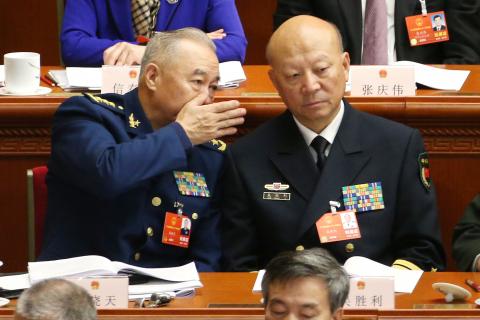The Ministry of National Defense yesterday reiterated President Tsai Ing-wen’s (蔡英文) pledge to increase the nation’s defense spending every year after this fiscal year.
The statement came after China announced it would raise its military spending this year.
China’s official military budget is to be 1.11 trillion yuan (US$175.1 billion), a 8.1 percent increase from last year, when China raised the budget 7 percent, Xinhua news agency reported.

Photo: EPA
Tsai has pledged to raise to the defense budget every year and earmark expenditures for planned procurements, ministry spokesman Major General Chen Chung-chi (陳中吉) said.
The government is also to make special budget proposals to cover the costs of major unplanned arms deals, instead of deducting such expenses from the defense budget, Chen said.
“This ministry is committed to promoting national defense autonomy and the security of our nation,” he said.
Meanwhile, China’s Taiwan Affairs Office Minister Zhang Zhijun (張志軍) blamed Taiwan for “increasingly severe and complicated” cross-strait relations at a news event yesterday marking the opening of China’s 13th National People’s Congress.
“We have resolute will, full confidence and even fuller ability to prevent any sort or form of Taiwan independence separatist acts,” Zhang said.
China has “encountered more risks and challenges” in cross-strait relations due to Taiwan’s refusal to acknowledge the so-called “1992 consensus” and “more forceful interventions by outside forces,” Zhang added.
The “1992 consensus,” a term former Mainland Affairs Council chairman Su Chi (蘇起) in 2006 admitted to making up in 2000, refers to a supposed tacit understanding between the Chinese Nationalist Party (KMT) and the Chinese Communist Party that both sides of the Taiwan Strait acknowledge there is “one China,” with each side having its own interpretation of what “China” means.
Taiwan is not the side that has been acting in ways that are detrimental to the relationship, Presidential Office spokesman Alex Huang (黃重諺) said.
The government’s commitment to peace and goodwill has been clear and consistent, a fact that is not missed by the international community, he said.
“The goodwill and promises of this government are unchanged. We have no intention of returning the nation to a confrontational course of action or bowing to pressure,” he said.

TRAGEDY STRIKES TAIPEI: The suspect died after falling off a building after he threw smoke grenades into Taipei Main Station and went on a killing spree in Zhongshan A 27-year-old suspect allegedly threw smoke grenades in Taipei Main Station and then proceeded to Zhongshan MRT Station in a random killing spree that resulted in the death of the suspect and two other civilians, and seven injured, including one in critical condition, as of press time last night. The suspect, identified as a man surnamed Chang Wen (張文), allegedly began the attack at Taipei Main Station, the Taipei Fire Department said, adding that it received a report at 5:24pm that smoke grenades had been thrown in the station. One man in his 50s was rushed to hospital after a cardiac arrest

PUBLIC SAFETY: The premier said that security would be tightened in transport hubs, while President Lai commended the public for their bravery The government is to deploy more police, including rapid response units, in crowded public areas to ensure a swift response to any threats, President William Lai (賴清德) said yesterday after a knife attack killed three people and injured 11 in Taipei the previous day. Lai made the remarks following a briefing by the National Police Agency on the progress of the investigation, saying that the attack underscored the importance of cooperation in public security between the central and local governments. The attack unfolded in the early evening on Friday around Taipei Main Station’s M7 exit and later near the Taipei MRT’s Zhongshan

SAFETY FIRST: Double the number of police were deployed at the Taipei Marathon, while other cities released plans to bolster public event safety Authorities across Taiwan have stepped up security measures ahead of Christmas and New Year events, following a knife and smoke bomb attack in Taipei on Friday that left four people dead and 11 injured. In a bid to prevent potential copycat incidents, police deployments have been expanded for large gatherings, transport hubs, and other crowded public spaces, according to official statements from police and city authorities. Taipei Mayor Chiang Wan-an (蔣萬安) said the city has “comprehensively raised security readiness” in crowded areas, increased police deployments with armed officers, and intensified patrols during weekends and nighttime hours. For large-scale events, security checkpoints and explosives

ON ALERT: Taiwan’s partners would issue warnings if China attempted to use Interpol to target Taiwanese, and the global body has mechanisms to prevent it, an official said China has stationed two to four people specializing in Taiwan affairs at its embassies in several democratic countries to monitor and harass Taiwanese, actions that the host nations would not tolerate, National Security Bureau (NSB) Director-General Tsai Ming-yen (蔡明彥) said yesterday. Tsai made the comments at a meeting of the legislature’s Foreign Affairs and National Defense Committee, which asked him and Minister of National Defense Wellington Koo (顧立雄) to report on potential conflicts in the Taiwan Strait and military preparedness. Democratic Progressive Party (DPP) Legislator Michelle Lin (林楚茵) expressed concern that Beijing has posted personnel from China’s Taiwan Affairs Office to its